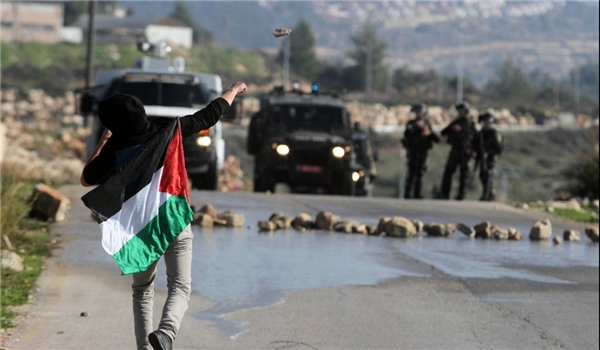
RNA - A Palestinian was injured with a live bullet, while tens of others suffered from tear gas inhalation after clashes erupted with Israeli forces near the entrance of Qalandiya refugee camp in Ramallah when Israeli forces suppressed a peaceful march Wednesday night in support of the mass hunger strike among Palestinians held in Israeli prisons, Ma'an reported.
Local sources told Ma’an that the march was launched from a hunger strike solidarity tent at the entrance of Qalandiya camp, and subsequently erupted into clashes with Israeli forces, who shot live bullets and tear gas at the demonstrators, and Palestinian youths who threw rocks and empty bottles at the soldiers.
Meanwhile, another sit-in was organized in solidarity with the hunger strikers in front of the International Committee of the Red Cross (ICRC) in the neighborhood of Sheikh Jarrah in occupied East Jerusalem and also suppressed by Israeli forces, who reportedly assaulted protesters and detained three.
Head of the Palestinian Prisoner’s Society (PPS) in Jerusalem Nasser Qaws told Ma’an that Israeli forces detained three activists during the demonstration, whom he identified as Ahmad al-Safadi, head of Elia for Media Group, Muhammad al-Daqaq, and Kayed al-Daqaq, while Arin Zaanin was injured after being “assaulted violently” by Israeli forces and was transferred in an ambulance to a nearby hospital.
Qaws said that Israeli forces “suppress solidarity” with the hunger-striking prisoners by “attacking protesters, including pushing elderly (Palestinians).”
Head of the Jerusalem Committee for Families of Prisoners Amjad Abu Assab said that Israeli forces arrived in the area and stationed themselves at the gates of the ICRC building, and proceeded to film the event and take pictures.
Abu Assab added that Israeli forces in a “sudden manner” began “attacking protesters” and “pushing them out of the Red Cross yard.”
Families of prisoners expressed concern during the demonstration over the deteriorating health conditions of the hunger strikers, as the sister of Jerusalemite hunger-striking prisoner John Qaqish, sentenced to nine years in Israeli prison over an alleged stabbing attack, said that her family had not received any information about Qaqish and that they were living in “fear and concern.”
Mother of imprisoned Palestinians Hamza and Islam al-Najjar from the East Jerusalem neighborhood of al-Tur said that their sons had launched their hunger strikes 30 days ago, but after several days Hamza ended his strike owing to his health condition, while Islam was recently transferred to a hospital and has continued his hunger strike.
She added that her son Hamza suffers from psoriasis, an autoimmune disease that affects the skin -- and that Israel Prison Service (IPS) does not provide him with medicine and refuses to permit his family to bring medicine to him in the prison.“We have offered to cover all of the costs of his treatment, but in vain. I can’t rest; I am always thinking about my sons,” she said.
Meanwhile, the mother of Jerusalemite prisoner Nasser Abu Khdier said that her son was transferred to Ohli Kidar prison since the start of the strike and is now in critical health, as he has lost 22 kilos of his weight and has been transferred to a controversial prison field hospital.
Since the hunger strike began, Israeli authorities have established field hospitals for Palestinian prisoners, Israel’s public security minister has confirmed.The move has raised alarm that hunger strikers, who have faced severe health deteriorations in recent days, will be force fed en masse, violating international standards of medical ethics and international law that regard the practice as inhumane or even a form of torture.
The mother of prisoner Muhammad Abu Khdier said that a court session was held for her son on April 27 on the 10th day of the hunger strike, when she said he already seemed exhausted and had lost some eight kilos of weight.
She added that she participates in every event organized in solidarity with the prisoners, saying that “all prisoners are our sons.” She also demanded that the ICRC provide more information about the conditions of the hunger strikers in Israeli prisons.
Palestinians across the occupied territory have been demonstrating, blocking roads, and carrying out other actions in solidarity with some 1,300 imprisoned Palestinians who marked the 31st day of their hunger strike on Wednesday, notably denouncing the international community's inaction regarding the prisoners' fight for their human rights.
Since the beginning of the strike on April 17, prisoners have been calling for an end to the denial of family visits, the right to pursue higher education, appropriate medical care and treatment, and an end to solitary confinement and administrative detention -- imprisonment without charge or trial, among other demands for basic rights.
847/940